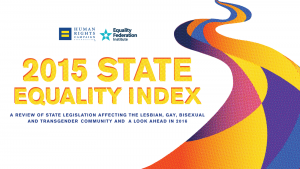 WASHINGTON – The Human Rights Campaign (HRC) in partnership with the Equality Federation, today released its second annual national report assessing the status of state legislation affecting LGBT equality across America, including in California.
WASHINGTON – The Human Rights Campaign (HRC) in partnership with the Equality Federation, today released its second annual national report assessing the status of state legislation affecting LGBT equality across America, including in California.
The State Equality Index (SEI) reveals that, even with historic progress on marriage equality, there are extraordinary state-to-state disparities in LGBT non-discrimination protections, including in the workplace, and efforts continue by equality opponents to pass state-level legislation that would sanction discrimination and undermine even minimal existing protections.
“Even with marriage equality the law of the land, the battle for LGBT rights at the state level continues to be a story of successes and setbacks,” said HRC President Chad Griffin. “Though a number of states are expanding access to non-discrimination protections for LGBT people and their families, a majority of states are still struggling to reach even a basic level of equality for LGBT people.”
“This year will be one of our most challenging yet, with our opponents in more than two dozen states pushing deeply harmful laws that undermine critical protections in the guise of ‘religious liberty,’” Griffin said. “Equally troubling are disgraceful bills targeting the transgender community — from preventing transgender people from using public facilities, including bathrooms, that accord with their gender identity, to denying them the ability to make gender and name changes on crucial identification documents.”
While more than 111 million people live in states where LGBT people lack clear state-level protections against discrimination in the workplace, the SEI points to a few encouraging signs – particularly in areas related to LGBTQ youth, health, and safety. States like Utah, New York, and Illinois expanded access to equality for LGBT people and their families, while others strengthened existing hate crimes laws, improved access to transgender-inclusive healthcare coverage, and protected LGBT youth from harmful “conversion therapy”.
The SEI assesses statewide LGBT-related legislation and policies, good and bad, in five areas: parenting laws and policies; non-discrimination laws; hate crimes laws; youth-related laws and policies; and health and safety laws and policies. Based on that review, the SEI assigns states to one of four distinct categories.
California falls into the highest-performing category, “Working Toward Innovative Equality.”
Six states and the District of Columbia are in the highest-rated category, “Working Toward Innovative Equality”
These states and the nation’s capital have robust LGBT non-discrimination laws covering employment, housing and public accommodations, as well as protections in the realm of credit, insurance, and jury selection. Most allow transgender people to change official documents to reflect their gender identity. Almost all bar private insurers from banning transition-related healthcare. LGBT youth are protected by anti-bullying laws, as well as innovative measures in some states that address conversion therapy, inclusive juvenile justice policies, homelessness, and sexual education. The states are: California, Colorado, Connecticut, Illinois, Oregon, and Washington.
Six states are in the category “Solidifying Equality”
These states have non-discrimination protections and are considered high-performing but not cutting edge on LGBT equality. Many of these states allow transgender individuals to change gender markers on official documents. More than half do not allow second parent adoption. These states have relatively robust anti-bullying laws, but bad laws begin to crop up in this category. The states are: Iowa, Maine, Massachusetts, New Jersey, New York, and Vermont.
Ten states are in the category “Building Equality”
These states have taken steps toward more robust LGBT equality, including passing basic non-discrimination and hate crimes laws. They allow gender markers to be changed on official documents, but have few protections for transgender health care. Some lack explicit gender identity protections, and several lack comprehensive anti-bullying laws. Bad laws are more common, so advocates work to stop bills that undermine LGBT equality, and to pass more comprehensive non-discrimination laws. The states are: Delaware, Hawaii, Maryland, Minnesota, Nevada, New Hampshire, New Mexico, Rhode Island, Utah, and Wisconsin.
Twenty-eight states are in the lowest-rated category “High Priority to Achieve Basic Equality”
Most of these states, including Arizona, North Carolina, Texas, and Florida, have many laws that undermine LGBT equality, from those that criminalize HIV and sodomy, to measures allowing religious-based discrimination against LGBT people. None have non-discrimination laws that explicitly include sexual orientation or gender identity protections; few have hate crime laws with those protections. LGBT advocates largely work to kill bad bills and pass municipal protections for LGBT people.
“While it’s gratifying to see California again ranked among the best of states in terms of LGBT equality, the State Equality Index also highlights a number of gaps that remain in the laws that protect our community,” said Rick Zbur, Executive Director of Equality California. “California is still one of the few states that does not mandate schools to have suicide presentation programs, an important goal to increase LGBT acceptance and reduce high LGBT dropout rates. Although the state of California adopted AB 959, which for the first time required data collection regarding sexual orientation and gender identity by certain California health and social services agencies, there is more work to be done in this area. Equality California is preparing a robust legislative agenda that addresses these deficiencies and that includes new, innovative legislation. One of these will be a bill to modernize HIV criminal laws that stigmatize and discriminate against people living with HIV.”
The full report, including detailed scorecards for every state, is available online at ww.hrc.org/sei.











